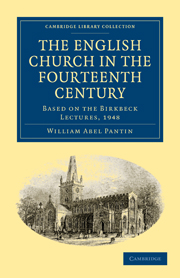Book contents
- Frontmatter
- Contents
- Preface
- List of Abbreviations
- I INTRODUCTION: THE LEGACY OF THE THIRTEENTH CENTURY
- PART I CHURCH AND STATE
- II THE SOCIAL STRUCTURE OF THE ENGLISH CHURCH
- III PATRONAGE AND THE USE OF BENEFICES
- IV PAPAL PROVISIONS
- V ANGLO-PAPAL RELATIONS
- PART II INTELLECTUAL LIFE AND CONTROVERSY
- PART III RELIGIOUS LITERATURE
- Appendix I The Latin text of passages quoted from manuscript sources
- Appendix II Two collections of didactic treatises
- Index
IV - PAPAL PROVISIONS
Published online by Cambridge University Press: 10 November 2010
- Frontmatter
- Contents
- Preface
- List of Abbreviations
- I INTRODUCTION: THE LEGACY OF THE THIRTEENTH CENTURY
- PART I CHURCH AND STATE
- II THE SOCIAL STRUCTURE OF THE ENGLISH CHURCH
- III PATRONAGE AND THE USE OF BENEFICES
- IV PAPAL PROVISIONS
- V ANGLO-PAPAL RELATIONS
- PART II INTELLECTUAL LIFE AND CONTROVERSY
- PART III RELIGIOUS LITERATURE
- Appendix I The Latin text of passages quoted from manuscript sources
- Appendix II Two collections of didactic treatises
- Index
Summary
So far we have been considering the exercise of patronage by local, English authorities, of which the Crown was the most important. Competing with this local patronage, however, was another system of patronage: papal provision. This subject has often been treated merely as one of the ‘abuses’ of the late medieval Church, along with simony or incontinent clerics. But in fact papal provision was simply part of the growing centralization of the Church which had been going on during the twelfth and thirteenth centuries; it was centralization applied to patronage, just as appeals to Rome, the use of judges delegate, and so forth, represented centralization applied to the judicial system. The system of papal provision meant that men were promoted to offices and benefices by the central authority, the pope, instead of by local methods of appointment. It was a system which could of course be used or abused, but it was not in itself an abuse; indeed it was capable of being used as an instrument of reform.
It is necessary here to pass over the earlier history and the theoretical basis of papal provision. It need only be said that the pope's right to dispose of all benefices was based on and indeed was part of the plenitudo potestatis which he wielded. Two thirteenth-century writers may be quoted on this point.
- Type
- Chapter
- Information
- The English Church in the Fourteenth CenturyBased on the Birkbeck Lectures, 1948, pp. 47 - 75Publisher: Cambridge University PressPrint publication year: 2010First published in: 1955

